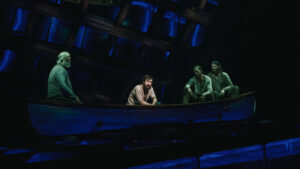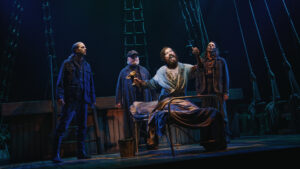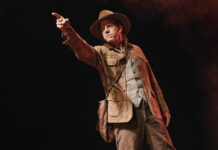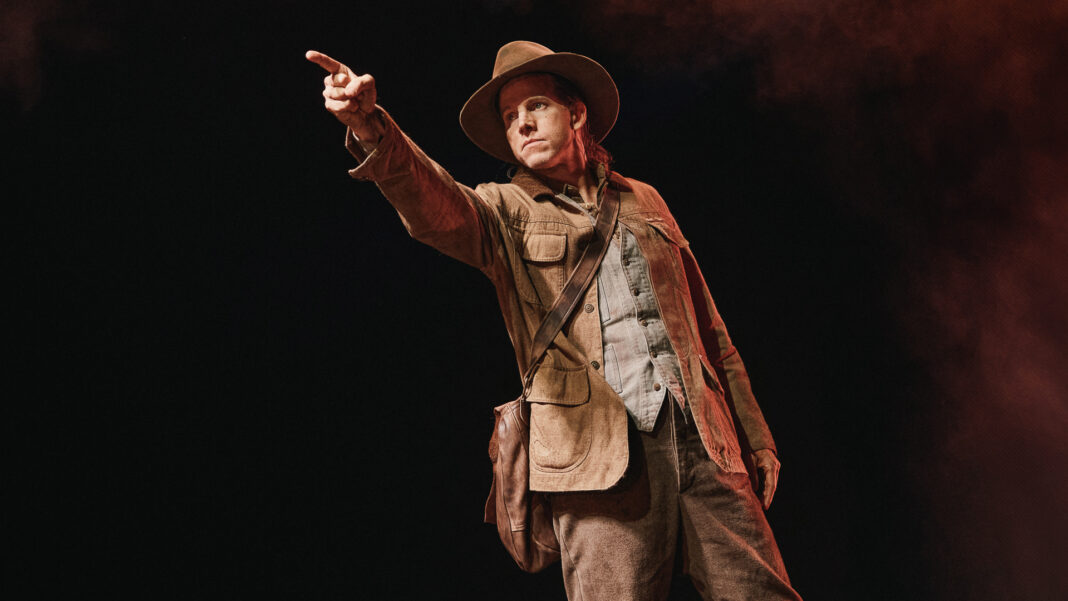It’s been 17 years since Stark Sands made his Broadway debut in the play Journey’s End. His performance resulted in the first of two Tony nominations for the actor. The second came for his performance in the musical Kinky Boots with Billy Porter.

Sands is back on Broadway in the new musical Swept Away which is now playing at the Longacre Theatre. The musical, set in 1888, tells the story of four men (Sands, John J. Gallagher, Adrian Blake Enscoe and Wayne Duvall) who survive a shipwreck in the middle of the Atlantic. What happens to them after the shipwreck is a tale of courage, fear, sacrifice and family. Swept Away is inspired by the Avett Brothers’ 2004 album Mignonette and Neil Hanson’s book (that inspired the album) The Custom of the Sea.
John Logan (Red) wrote the book for Swept Away which had its debut at Berkeley Repertory Theatre in 2022. A stop at Arena Stage in Washington, D.C. preceded the Broadway run. Through it all director Michael Mayer kept the same four actors in the roles they created…including Sands.
In this interview Sands talks about the themes of Swept Away, the brotherhood that the four actors have forged and the thrill of originating new roles on stage. What follows are excerpts from our conversation that have been edited for length and clarity. To see the full interview, please go to our YouTube channel.
Q: I want to take you back in time to the fall of 2001. I’m guessing that was about when you first appeared on the set of Six Feet Under to play the character of Toby for two episodes. It’s your first real professional gig. What do you think that young man from 23 years ago would say about where you are in your career right now and the choices that you’ve made to get there?
It’s a really lovely thing to think back to that time. That was my first job out of college. I was so lucky to get it and grateful to be on a show that happened to be a big hit from season one. All of a sudden I get these two episodes on season two when all these people are tuning in because it’s just won the Golden Globes.
I think he’d be very proud. I think I’m exactly where I hoped I would be and dreamed that I would be. I had a lot of confidence coming out of drama school. I went to USC. I was in the BFA program there. It’s a very selective program and I came out of college with a lot of confidence. I think it served me well.
You’ve been able to originate roles in several musicals: Tunny in American Idiot, Charlie Price in Kinky Boots and now Older Brother in Swept Away. What do you find is the greatest challenge and the greatest benefit of being the first person to bring a character to life on stage?
I feel honored that I have the sort of stamp of originality on some of these roles. I love that I don’t have to think about anything but whatever’s coming out of me. There is a real sense of pride because, if the show runs and people take over and then the show gets licensed and goes out to colleges and high schools, I hear kids singing riffs that I made up. It is magic to know that’s me; because something that I did in the moment is now cemented as part of the history of that show.
You told Talkin’ Broadway in 2010 that you can’t play a character “unless you can find a shade of yourself in it.” What are the shades you found in Older Brother that unlocked the character for you in Swept Away?
He is fiercely loyal to his family. The first time we did the show, we did it in Berkeley, California, during Covid. It was started in December 2021 through March of 2022. Because I have two kids, my wife and kids had to stay here in New York and I had to leave them behind. In the show a large part of it is missing your loved ones and wishing you could be with them. That was very reachable for me and the rest of us as we were sort of stuck in Berkeley, isolated, without any ability to go out and socialize beyond our little cast. I think it was ultimately a huge benefit for the show because we bonded so strongly on that experience that the work we’re able to do now is incredibly detailed and really benefits from that.
Jesse Green wrote in his review for the New York Times, that Swept Away was “amongst the darkest, most unsparing musicals ever to anchor itself on Broadway.” Do you feel the darkness of this show and what are the steps necessary for you as an actor or for the company to get through eight shows a week of such intense material?
I feel the darkness. Part of the sacrifice of committing yourself to doing this as an actor is you have to believe it while it’s happening. You have to actually go there mentally. I have to face my own death. These are things that normally, if we have these thoughts in the middle of the night, like someday I’m going to die, you push it away.
When I became a parent the idea of losing one of them to some tragedy is really not something you want to think about. I have to do it every night because my little brother in the show is at risk of passing away. That is something that I have to just deal with. It is dark, but there is salvation at the end, which is really important for people to know. It’s not just a total bummer. I hope it makes people cry and I hope it makes people ask questions of themselves and to wonder what they would do if they were put in this situation.

Director Michael Mayer said that he would only continue with the show after Berkeley if the four of you were going to be allowed to remain with the show. That’s a level of commitment that not a lot of people offer. What did that commitment that he made to the four of you mean to you? That’s pretty rare in this business.
It really is. I have never done a show that had an out-of-town run and then the exact same people went to Broadway. We did two out-of-town runs. In the original run there were the four principals, the same four guys, and there were only four sailors. Over the runs they have multiplied that. Now we have, I believe, ten onstage sailors and four principals and a few swings who come on and support it in some certain moments.
We all understand what a magical thing we have here; what an original piece of theater and art this is. So I would say that it was all for one and one for all. We fought for each other as well; the bonding that we did in Berkeley and in D.C. I had the luxury in the out-of-town runs to just live in the show. If we had to start over with someone else, it just wouldn’t be the same. You wouldn’t have that level of detail and trust.
Scott Avett told Alan Light in the New York Times that “The whole concept of Mignonette was a commitment to truth because they hung themselves on truth when they were rescued.” How does that perspective inform the truth that you and your fellow cast mates bring to this show?
Ultimately, this is a story about three ghosts. You learn that in the first moment of the show. We are haunting Gallagher. Asking him to tell the truth about what happened and he doesn’t want to because he’s ashamed of it. I think that we gain a lot from admitting our faults and expressing the shame that we might feel about the things that we’ve done. You can narrow that down to an individual or you can make it about a country and the choices that a country has made over time.
I don’t think that the show is a political commentary at all. But people can take what they want from it. I think we are living in a time when some people just don’t want to acknowledge mistakes that we’ve made in the past. And I think that is a mistake to not acknowledge those things.
It wasn’t just Mignonette that inspired this, but there was also Neil Hansen’s The Custom of the Sea. Now, we don’t need to go into what that custom was, but how do you think that custom today resonates in terms of just pure survivalism? Is there a metaphor about survivalism that we can get from this story?
I have read all of the shipwreck survival books now. I’m the kind of actor who really dives in and wants to really provide as much context for my imagination as possible. When I get a role I want to read the original, obviously, and then I want to read anything else that might help. I’ve been with this project for five years now, I’m going to have read it all.
If you’re stuck on a lifeboat, you have no food, you have no water. At a certain point, there is an option that you can take. It’s not something people want to think about. But it was the reality of life at sea in the 1600s, 1700s, 1800s. It just happened whenever there was no hope left. There’s a moment when Johnny faces the audience and says, before you turn away too quick, you ask yourself, what would you do to see your family again? To see your wife or your sweetheart? How far would you go? I do think it’s important to ask that question sometimes. I’m a parent and I can say to you right now there’s nothing I wouldn’t do to save the life of my children. That’s easy. It’s not even a second thought.
You made your Broadway debut in Journey’s End which is a story about sacrifice. Here you are 17 years later in Swept Away where sacrifice is also a part of the story. What does sacrifice mean to you personally, and what do you think we as a society can learn about sacrifice in a time when most people seem obsessed with self-promotion?
I think of sacrifice and I think of the sacrifices that my wife and my kids have made for me to be able to do this job – this specific job. The life of an actor is one that is in direct conflict with family time. I’m gone on evenings and weekends. That’s when most people see their kids. I’m fully available right now, but my kids are in school. It’s not easy. That’s a sacrifice that they have made for me. I get to do what I love. I miss my wife and my kids, but I there is benefit to it because I get to be on Broadway doing this show eight times a week. But they have given up many, many months of having Dad around because of my job. That is not lost on me. I miss them dearly when I can’t be with them. But I recognize that it’s not just me making that sacrifice. Primarily it’s them. That’s what I take with me moving on through this. And if I’m lucky enough to keep working in this business on projects that I passionately care about, there is a sacrifice on both sides.
Do you think that we as a society need to learn a little bit more about what sacrifice is?
Yes. I think that we are living at a time when immediate gratification is becoming a real problem. People can get whatever they want by tapping a few buttons on their phone or their computer and it’s delivered to you later that day or the next day. So there is very little sacrifice being made, at least in terms of that gratification. I remember a time when even just wanting to watch something on TV, you had to get there and sit in front of it. I’m old enough to remember that and I worry about the direction we’re going; where everything is available all the time.
I kind of hate social media. That’s not a secret. I’m barely on it. I find it to be a huge distraction from real life. I’m grateful that we can do this because I’m talking to you in real time. I know we’re on our devices and we’re having this conversation, but at least it’s a real conversation and it’s not some cultivated, curated version of my life that I’m trying to show off.
To watch the full interview with Stark Sands, please go HERE.
UPDATE: SWEPT AWAY has announced it will be closing on December 29th. A two-week extension has been added since the original closing date of December 15th was announced.
Main Photo: Stark Sands in Swept Away (Photo by Emilio Madrid)











